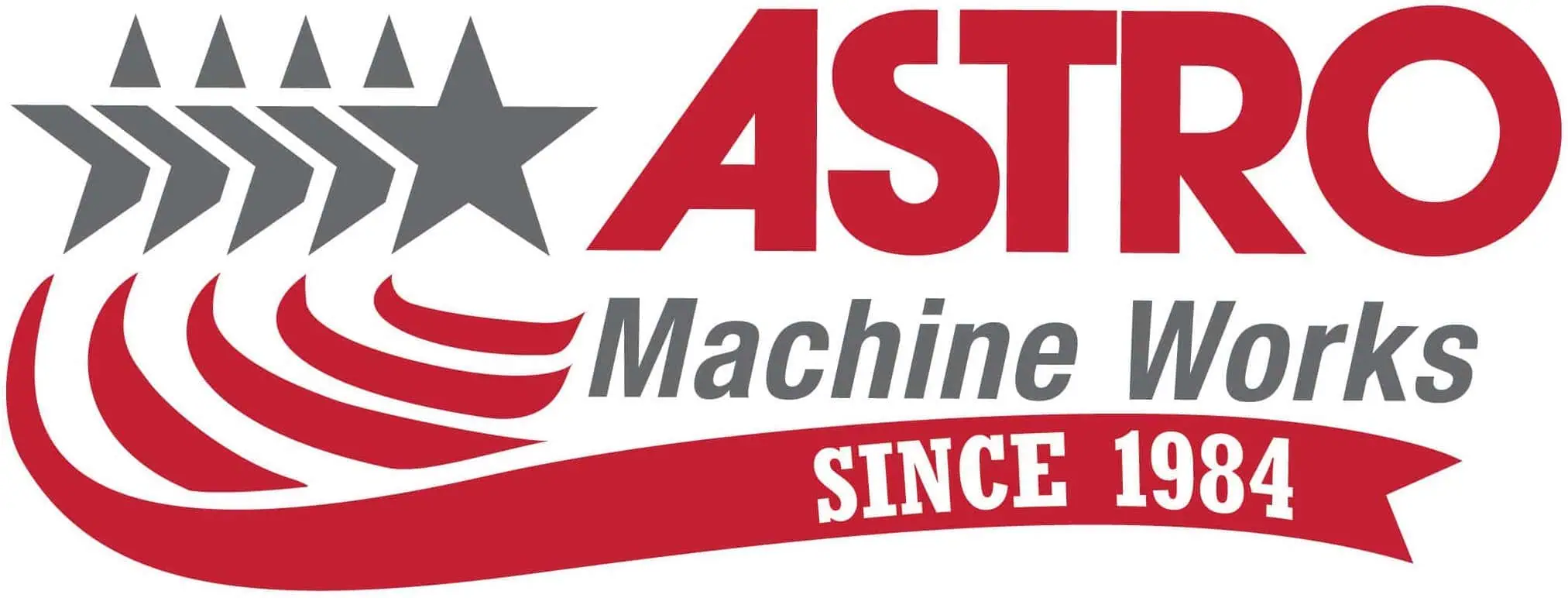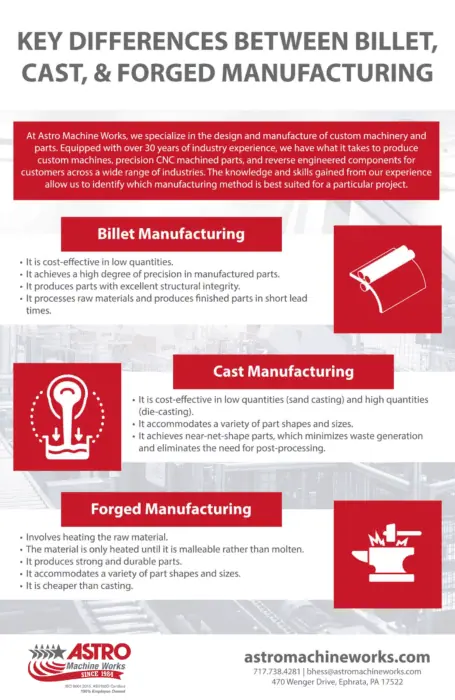Key Differences Between Billet, Cast, & Forged Manufacturing
Every part we produce starts with the right manufacturing process. At Astro Machine Works, we help you choose the best method—billet, cast, or forged—based on your project’s requirements for strength, precision, and cost efficiency. Our experience as a contract manufacturer allows us to handle every stage of production, from raw material to finished assembly.
Our team of engineers, machinists, fabricators and welders work side by side to deliver reliable, high-quality components. As a precision CNC machine shop, we focus on accuracy, consistency, and performance for industries that can’t compromise on quality.
Billet Manufacturing
Billet manufacturing begins with a solid block or bar of metal—often aluminum, steel, or titanium. This billet serves as the foundation for precision machining. Using advanced precision machining CNC equipment, the metal is shaped into its final form by cutting away material to achieve exact dimensions and surface finishes.
Billet manufacturing is often chosen when a part requires maximum strength and dimensional accuracy. Because the billet has a uniform grain structure, the finished part is more durable and less prone to defects. It’s an ideal option for low- to medium-volume runs where precision and quality matter most.
Benefits of Billet Parts:
- Excellent structural integrity for critical applications
- Tight dimensional tolerances and smooth finishes
- Short lead times compared to casting or forging
- Cost-effective for smaller production quantities
Astro’s Billet Capabilities
Astro Machine Works operates as a precision CNC machine shop equipped with multi-axis machining centers that produce detailed billet parts with high accuracy. Every part is machined to meet exact specifications and thoroughly inspected before delivery.
Our engineers, machinists, fabricators and welders also support projects that combine machined billet components with welded assemblies, ensuring compatibility across manufacturing stages. Through our contract manufacturing services, we manage the entire process—from billet selection and machining to finishing and assembly—so you receive a complete, production-ready solution.
Learn more about Astro Machine Works unique manufacturing service offerings, including CNC machining, reverse engineering, and more.
Learn More Contact UsCast Manufacturing
Casting involves heating metal until it becomes molten, then pouring it into a mold that defines the desired shape. Once cooled, the metal solidifies and is removed from the mold. This process is ideal for producing complex geometries or parts with internal cavities that would be difficult or costly to machine from solid metal.
Benefits of Casting:
- Well-suited for high-volume production
- Capable of producing intricate shapes and details
- Offers a variety of material options
- Reduces machining time and material waste through near-net-shape results
Astro’s Expertise in Cast Component Finishing
Astro Machine Works specializes in precision machining CNC operations that take cast components and bring them to final specifications. Our team is highly skilled in machining, finishing, and assembling cast parts for industries like aerospace, medical, and industrial equipment.
Our engineers, machinists, fabricators and welders often work alongside machinists to modify or assemble cast parts that require additional structural support. By combining precision machining and fabrication, we deliver cast components that are accurate, functional, and ready for service.
Through our contract manufacturing approach, customers benefit from a single point of contact for machining, inspection, and final assembly. That means fewer handoffs, shorter production times, and consistent quality from start to finish.
Forged Manufacturing
Forging involves heating metal until it’s pliable and then shaping it using compressive forces, such as hammering or pressing. Unlike casting, the metal never melts—this preserves its grain structure and produces parts with exceptional strength and durability.
Advantages of Forged Components:
- Superior mechanical strength and resistance to fatigue
- Excellent performance under stress or high load
- Suitable for aerospace, energy, and heavy industrial applications
Astro’s Role in Forged Component Processing
Forged components often require precision finishing to meet final specifications. Astro’s precision CNC machine shop is equipped to machine forged blanks into accurate, fully finished parts. We handle critical operations such as drilling, turning, and milling with tight tolerances.
Our engineers, machinists, fabricators and welders provide additional support for assemblies that combine forged parts with machined or cast components. The result is a seamless integration of strength, precision, and craftsmanship.
As part of our contract manufacturing services, Astro manages the complete process—from machining and welding to inspection and delivery—giving you confidence that every forged part meets exact requirements for strength and performance.
Why Work with Astro Machine Works
Choosing Astro Machine Works means working with a trusted partner that understands the demands of modern manufacturing. We combine precision machining CNC expertise, skilled engineers, machinists, fabricators, welders, and a fully equipped precision CNC machine shop to deliver consistent results.
Our contract manufacturing model allows us to manage every phase of production under one roof. We coordinate design reviews, machining, welding, finishing, and inspection so you can focus on your operations while we deliver high-quality, production-ready components.
Clients rely on us for:
- Expert guidance on billet, cast, and forged manufacturing
- Tight-tolerance machining and repeatable accuracy
- End-to-end contract manufacturing solutions
- Quality assurance supported by ISO-certified processes
Contact us today to discuss your project or request a quote. Experience the precision, reliability, and craftsmanship that define Astro Machine Works—a trusted precision CNC machine shop with proven expertise in billet, cast, and forged manufacturing.


